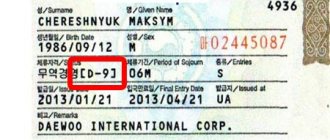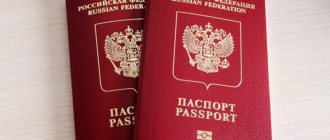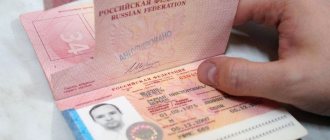What is an electronic passport?
An electronic passport is a new identity document that the Russian Government plans to introduce throughout Russia. This is a plastic card with a built-in electronic chip. It will contain the citizen’s personal data, photograph, and will also include document data:
- TIN,
- SNILS,
- Driver's license details.
This data will be encoded into the digital chip of the new card.
Unlike the paper version, the electronic passport will contain several different photographs. One will be placed on the front side of the plastic card, the others will be encoded in the chip. Photographs will be taken from different angles. In addition, the following will be recorded on the electronic chip:
- Photo of the iris of the eye,
- Fingerprints.
This information will allow you to reliably identify the owner and also protect the electronic passport from forgery.
According to plans, a new passport will be changed once every 10 years. In addition, it can be replaced due to changes in personal data, or in the event of its loss.
Why change the passport format?
Many generations of Russians have already become accustomed to the old version of the passport and sincerely do not understand why anything should be changed. But the rejection of paper documents, certificates and certificates is a worldwide practice that has long proven its feasibility. The main advantage of a plastic card is that, thanks to a special chip, it includes a lot of different information about its owner. It can combine a citizen's basic identification information with information about their insurance, driver's license, bank account, etc. This means that having an electronic passport eliminates the need for other paper documents.
In many countries where a similar innovation is already in place, citizens use a plastic ID to pay bills, send their children to kindergarten and school, get a job, interact with local authorities and perform many other transactions. Due to the fact that the document includes all the basic information about the owner, a person can receive quality service in government agencies anywhere in the country and even abroad.
This is interesting: Agreement of intent for the lease of non-residential premises sample
It is also important that, unlike a regular passport, a plastic card:
- It is small in size and convenient to carry in a wallet or pocket;
- does not wrinkle or bend due to careless storage;
- does not get wet under the influence of moisture;
- does not fade or wear off.
A document in this form cannot be written over with a ballpoint pen, torn due to careless movement, or damaged by mistakenly washing it with trousers. The advantages of a passport in this format are obvious, so one question arises: why the decision to introduce it was not made earlier.
Advantages and disadvantages
An electronic passport has the following advantages:
- Convenient, compact size allows you to store the card in your wallet.
- Resistance to mechanical damage.
- Moisture resistance.
- A single document that stores the data of TIN, SNILS and other documents.
- The period for obtaining a document at the place of residence, and not at registration, is reduced from 60 days to 10 days.
- Possibility to apply for an electronic passport remotely.
In addition to the obvious advantages, there are also obvious disadvantages:
- Limited shelf life. The plastic card wears out from constant use. People who use such an ID every day may have to change their card every few years.
- Fragility. Despite the fact that a plastic card is stronger than a paper book, if used carelessly, it can be damaged, for example, by putting it in the back pocket of jeans and then sitting on a chair.
- Chip damage. In the event of such a breakdown, the document becomes impossible to use for its intended purpose. In addition, it will be impossible to read information from the chip if the reading device is not working or, for example, if there is a power outage.
- If an electronic passport falls into the hands of fraudsters, they will have access to all relevant information about its owner, including additional data such as TIN, SNILS and others. This can lead to unpredictable consequences.
- Not all cities and towns in Russia will immediately have reading devices. This means that you will have to use a classic paper passport there.
Despite the shortcomings, citizens will not have the opportunity to refuse the new ID card when its implementation is legally implemented.
When the project comes into force throughout Russia, all 14-year-olds will be required to receive an electronic passport, and will also require owners of paper documents to replace them with an electronic equivalent.
We also note that the Russian Orthodox Church is protesting against the introduction of new passports.
Electronic passport: how the new document will change the lives of Russians
From December 1, 2021, Muscovites will be able to obtain an electronic passport of a Russian citizen, and no later than July 1, 2023, residents of the entire country will receive this opportunity. Read about what the new format of the main identification document will be and what advantages it will give in the material of Evening Moscow.
What data will be included in the document?
Externally, the electronic passport will be similar to a bank card with a chip. It will contain at least a photograph, full name, and date of birth. In addition, biometric data will be stored on the document: in addition to the face, fingerprints of the papillary patterns of two fingers will be entered into the database.
Unlike a paper passport, the place of registration will not be written on the smart card. Information about this will be stored on the chip - exclusively in electronic form.
They plan to gradually expand the functionality of the document. Subsequently, it will be possible to link, for example, a driver’s license to it and not carry it with you. In addition, already in 2021-2022, as an addition to the passport with a chip for a wide audience, an application project will be launched - a mobile citizen identifier. It can be installed and activated in the MFC using a biometric cockpit. It will partially replace the passport. But at the start of the project there will be few services. In particular, the program can be used to conclude employment contracts, to enter a building, to confirm age when purchasing tobacco or alcohol, as well as when contacting the MFC and the government services portal.
Photo: AGN Moscow
At the same time, despite all the innovations announced by the Russian Ministry of Digital Development, the paper passport is not going anywhere. Now a citizen will simply have a choice of two types of media, both when replacing and when issuing a new document.
Information will be protected
Citizens should not worry about the introduction of electronic passports and the safety of personal data. Associate Professor of the Department of Telecommunication Systems at the National Research University MIET, Candidate of Technical Sciences Alexander Sharamok is sure of this
— State bodies should deal with security, and I think they will pay due attention to this issue. My opinion is that the bases are sold not by government agencies, but by commercial entities. Yes, there are cases related to the Ministry of Internal Affairs, the State Traffic Safety Inspectorate, and so on, but, as far as I see, order is being restored in this area, the expert is sure.
The specialist notes a number of important advantages of electronic passports. In essence, they are similar to the advantages of electronic payment systems.
— Using electronic payments, you can pay for purchases without leaving home or without carrying cash. Here too, it will be, first of all, the opportunity to more quickly and securely provide remote services and reduce certain costs. For example, you came to the clinic, and you will already have all the documents with you. And you won’t need to frantically search or go home for them,” Sharamok stated.
There will be no false passports
On the other hand, the risks here are obvious, he adds. Electronic passports will allow the state to more clearly and successfully control some areas of life. At the same time, such activity by the authorities will reduce the scope for attackers.
And if electronic payments, in addition to convenience, make it possible to minimize the threats associated with the circulation of “gray” cash, then when switching to electronic passports, there will be fewer forgeries of identity documents. Such schemes will simply become impossible for outsiders to implement, concluded Sharamok.
What will change in obtaining and replacing an ID card?
An electronic passport will be issued to all citizens. There will be the following changes:
- The passport will need to be changed every 10 years, as well as in the event of its loss, damage or change of personal data (for example, when changing a surname upon marriage).
- If the document is lost, it can only be obtained from the authority where the passport was originally issued.
- The period for processing a new document will be reduced to 10 days.
Who will need to get a new passport?
When the new standard is introduced, gradually all citizens of the Russian Federation will have to switch to it. The replacement procedure will take several years. There are a number of citizens who will need to immediately receive an electronic passport. These include:
- Citizens of the Russian Federation who have reached 14 years of age. Their first passport will be digital.
- Persons whose old document has expired. For example, upon reaching the age of 20 or 45 years.
In addition, you will need to obtain an electronic passport in the following cases:
- If the old document is worn out or damaged,
- If you lose your old ID card,
- When a citizen changes gender,
- If personal data changes requiring a document replacement,
- When you entered inaccurate data into a previous document.
Main functions of the new document
The new document retains all the properties of the old ID card. In addition to the personal identification function, a number of new features have been added to it:
- Pay for a ticket in transport, if you have a special reading device,
- Pay for services in medical institutions,
- Change your place of registration (registration) remotely,
- Get information about TIN, SNILS and driver's license,
- Register individual entrepreneurs and LLCs without visiting the tax office,
- Take part in elections
- Remotely open bank accounts,
- Deposit money according to payment orders.
Rules for obtaining or replacing an identity card
To date, the procedure for obtaining an electronic passport has not yet been developed and approved by the Russian Government. A paper type ID can be obtained at the passport office or at the MFC. Most likely, new plastic will be issued there.
It is safe to say that an application for the issuance of a new document can be submitted through the State Services portal when such an opportunity appears there. You can create a personal account on the State Services portal now. To do this, you need to fill out the registration form, indicating personal and contact information, as well as passport and SNILS information. After checking the data, a personal account will be opened for you. It is through him that it will be possible to order a new plastic ID card. But you will also have to pick it up at the passport office or MFC.
There are a number of documents that must be collected to obtain an electronic passport. These include:
- Statement,
- TIN (Individual Taxpayer Number),
- SNILS,
- Birth certificate if you receive the document at 14 years old, or a previous passport if you receive the document at an older age,
- Four photographs of the approved standard,
- Men over 18 years of age may be required to provide military identification.
When will electronic passports be issued?
Already next year, 2021. Moscow will become the pilot region. Not only people who need to change their document due to age or other reasons (for example, change of surname, theft or loss), but also everyone will be able to receive new passports. Currently, an ordinary passport, in accordance with the Regulations on the Passport of a Citizen of the Russian Federation, approved by Decree of the Government of the Russian Federation of July 8, 1997 No. 828, is issued at the age of 14 and is valid until the age of 20, and from 20 years - until the age of 45. summer age. From 45 years of age, the passport is valid indefinitely.










